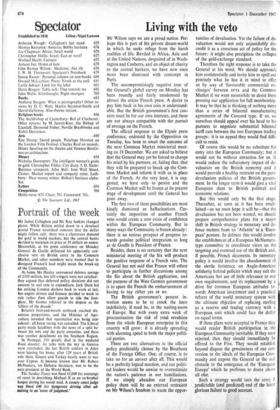Portrait of the week
Mr James Callaghan and Mr Roy Jenkins changed places. While Britain settled down to a devalued pound France nourished rumours that the dollar might follow suit: there was a clamorous demand for gold in world markets, but the central banks decided to maintain its price at 35 dollars an ounce. Meanwhile, at his press conference on Monday General de Gaulle delivered his apparently con- clusive veto on British entry to the Common Market, and other members were warned that to disregard France's lead might mean the break-up of the Community.
At home Mr Healey announced defence savings of /103 million, but left-wingers were not satisfied: they argued that deferred policy decisions did not amount to real cuts in expenditure. Jack Dash led his striking London dockers back to work at last, but engine drivers and firemen decided to work to rule rather than allow guards to ride the foot- plate; Mr Gunter referred to the dispute as the 'silliest of the decade.'
Britain's foot-and-mouth outbreak reached dis- astrous proportions, and the Minister of Agri- culture revealed that vaccination was being con- sidered: all horse racing was cancelled. The Liberal party made headlines with the news of a split be- tween the airs and the party executive, and there was another derailment on the Southern Region.
In Portugal, 316 people died in the weekend flood disaster. As talks with the to.F in Geneva were concluded, the last British soldiers in Aden were leaving for home, after 129 years of British rule there. Greece and Turkey nearly went to war over Cyprus. It became known that Mr Robert McNamara, us Defence Secretary, was to be the next president of the World Bank.
The Sunday Times was fined £5,000 for contempt of court in describing Michael X as an ex-brothel keeper during his recent trial. A county court judge well fined £40 for dangerous driving after ad- mitting to an 'error of judgment.'


































 Previous page
Previous page